-
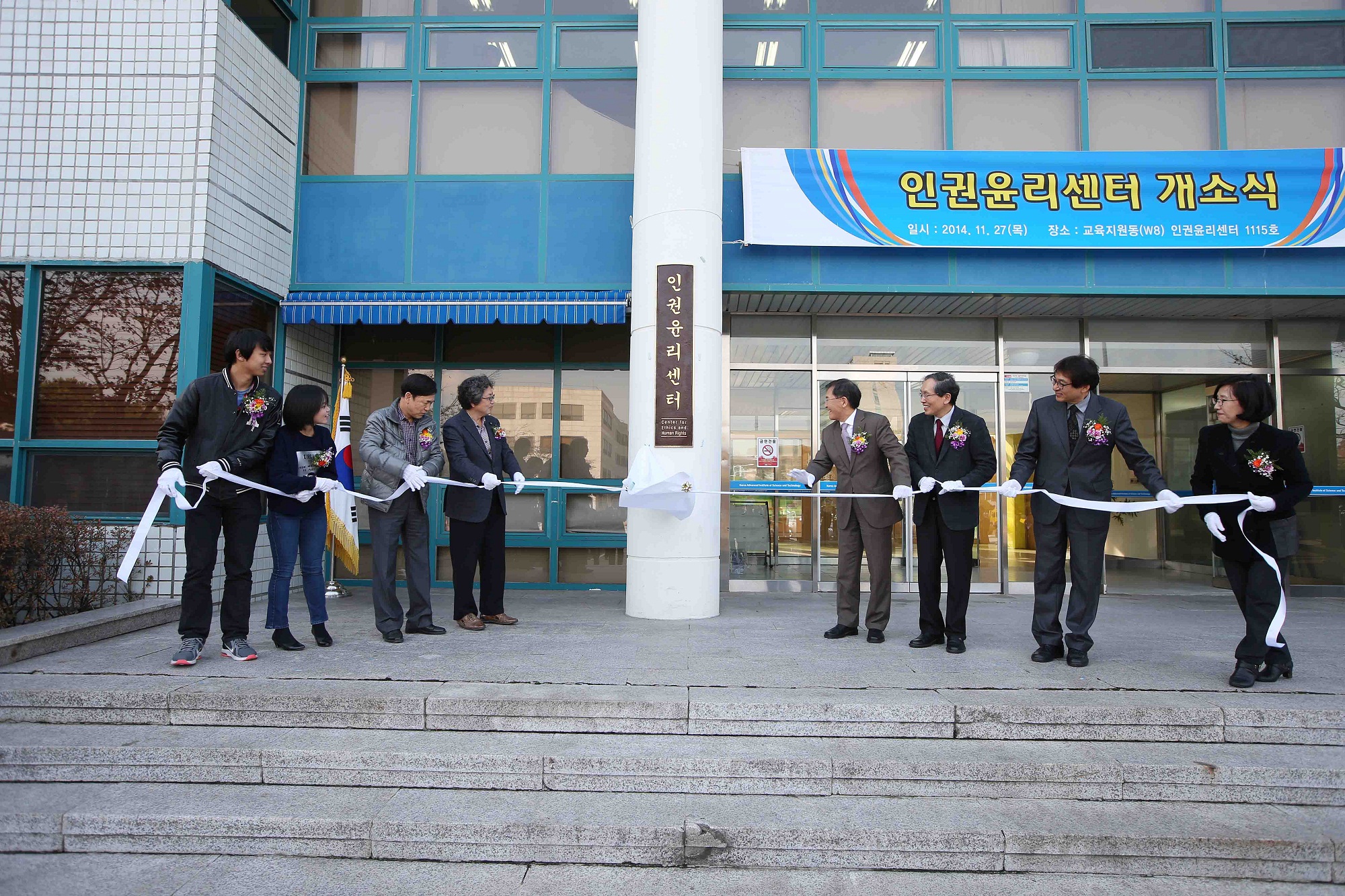 KAIST Establishes a Center for Human Rights and Ethics
KAIST hosted an opening ceremony on November 27, 2014 for its Center for Human Rights and Ethics (CHRE) located in the Education Support Building on campus.
President Steve Kang and other senior administrators participated in the ceremony, pledging to eliminate violence, corruption, and prejudice on the campus.
The CHRE was created to provide members of the KAIST community with one-stop service to report and process human rights violation cases and issues related to corruption and illegalities such as verbal abuse, physical assault, sexual harassment, and bribes. The center will also launch campaigns to promote and strengthen awareness of human rights and ethics within the university.
The Director of CHRE, Professor Young-hee Kim of the Department of Humanities and Social Sciences at KAIST said, “The center will serve an important role in the improvement of human rights and in the reestablishment of moral standards in KAIST. I hope KAIST members make the most of the center wherever they face injustice and unequal treatment during their study and work at the campus.”
2014.12.08 View 7841
KAIST Establishes a Center for Human Rights and Ethics
KAIST hosted an opening ceremony on November 27, 2014 for its Center for Human Rights and Ethics (CHRE) located in the Education Support Building on campus.
President Steve Kang and other senior administrators participated in the ceremony, pledging to eliminate violence, corruption, and prejudice on the campus.
The CHRE was created to provide members of the KAIST community with one-stop service to report and process human rights violation cases and issues related to corruption and illegalities such as verbal abuse, physical assault, sexual harassment, and bribes. The center will also launch campaigns to promote and strengthen awareness of human rights and ethics within the university.
The Director of CHRE, Professor Young-hee Kim of the Department of Humanities and Social Sciences at KAIST said, “The center will serve an important role in the improvement of human rights and in the reestablishment of moral standards in KAIST. I hope KAIST members make the most of the center wherever they face injustice and unequal treatment during their study and work at the campus.”
2014.12.08 View 7841 -
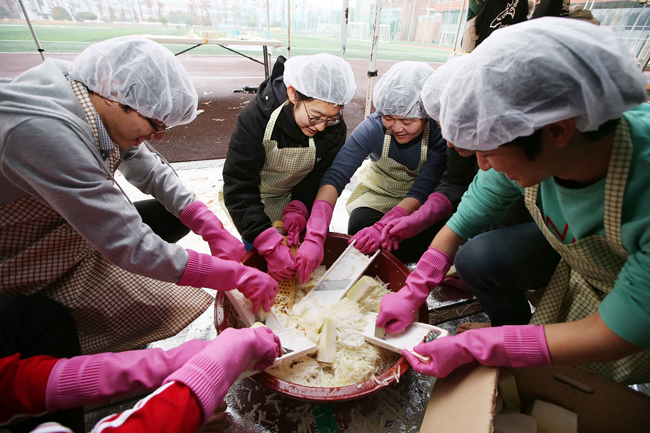 Kimchi Making by Students and KAIPlus Members
Kimchi is a traditional Korean dish of fermented vegetables, with the most common ingredients of Napa cabbages and daikon radishes. Every winter, Koreans make bountiful amounts of kimchi for consumption in the winter months.
President Steve Kang and about 50 KAIST students and members of KAIPlus, a volunteer group consisted of spouses of KAIST Faculty, made kimchi on November 28, 2014 at the Sports Complex on campus. They prepared 500 Napa cabbages for kimchi which were donated to local people in need.
2014.12.08 View 6063
Kimchi Making by Students and KAIPlus Members
Kimchi is a traditional Korean dish of fermented vegetables, with the most common ingredients of Napa cabbages and daikon radishes. Every winter, Koreans make bountiful amounts of kimchi for consumption in the winter months.
President Steve Kang and about 50 KAIST students and members of KAIPlus, a volunteer group consisted of spouses of KAIST Faculty, made kimchi on November 28, 2014 at the Sports Complex on campus. They prepared 500 Napa cabbages for kimchi which were donated to local people in need.
2014.12.08 View 6063 -
 KAIST Partners with Science-focused Universities in Korea for Student Exchange Programs
KAIST and four science-focused universities in Korea (Pohang University of Science and Technology, Gwangju Institute of Science and Technology, Daegu Gyeongbuk Institute of Science and Technology, and Ulsan National Institute of Science and Technology) agreed to exchange programs during academic semesters including summer and winter terms by signing a memorandum of understanding (MOU) on November 28, 2014. The signing ceremony took place at the KAIST campus with the participation of academic affairs deans from all five universities.
Based on the agreement, KAIST students can take up to 12 credits of coursework at any of the said universities and have unimpeded access to the university facilities during their coursework.
Dean Hyun-Wook Park of Academic Affairs at KASIT said, “Through exchange programs, students can capitalize on each university’s advantages, and this eventually will lead to greater advancement in science and technology in the nation.”
2014.12.08 View 8989
KAIST Partners with Science-focused Universities in Korea for Student Exchange Programs
KAIST and four science-focused universities in Korea (Pohang University of Science and Technology, Gwangju Institute of Science and Technology, Daegu Gyeongbuk Institute of Science and Technology, and Ulsan National Institute of Science and Technology) agreed to exchange programs during academic semesters including summer and winter terms by signing a memorandum of understanding (MOU) on November 28, 2014. The signing ceremony took place at the KAIST campus with the participation of academic affairs deans from all five universities.
Based on the agreement, KAIST students can take up to 12 credits of coursework at any of the said universities and have unimpeded access to the university facilities during their coursework.
Dean Hyun-Wook Park of Academic Affairs at KASIT said, “Through exchange programs, students can capitalize on each university’s advantages, and this eventually will lead to greater advancement in science and technology in the nation.”
2014.12.08 View 8989 -
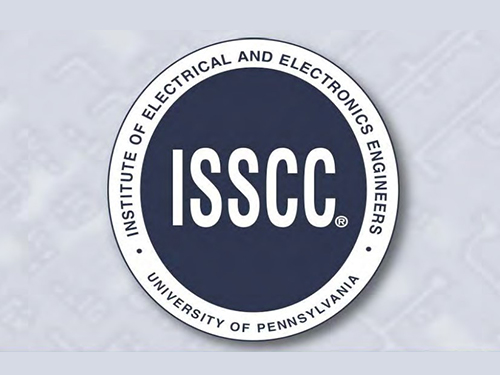 KAIST Presents the Largest Number of Research Papers at the 2015 ISSCC
KAIST will present the largest number of research papers at the 2015 IEEE International Solid-State Circuits Conference (ISSCC), a leading global forum held every year to share professional knowledge and advancements in solid-state circuits and systems-on-a-chip. The Institute of Electrical and Electronics Engineers (IEEE) Solid-State Circuits Society sponsors the conference.
This year, the conference accepted 13 research papers from KAIST, ranking first among the participating organizations. Samsung Electronics Co., Ltd. took second (9 papers) place, and Intel Corporation and IMEC were in third place with 8 papers, respectively. A total of 610 papers were submitted, and reviewers selected only 206 papers for presentation at the next year's conference.
Since 2011, KAIST has been the number one institution among universities with the largest number of papers presented at the conference.
The Associate Chair of ISSCC Program Committee Chair, Professor Hoi-Jun Yoo of the Department of Electrical Engineering at KAIST, said, “Korea started the semiconductor industry in the 1970s, and since then, KAIST has been the center of research and development for the industry. With the establishment of IC (integrated circuit) Design Education Center in 1995, KAIST has contributed tremendously to the education and research of semiconductor production, nationally and globally. As shown from the record of presenting research results at the ISSCC, KAIST will continue to collaborate closely with the industry and lead the field.”
The 2015 IEEE ISSCC will take place on February 22-26, 2015 in San Francisco, CA, in the US.
2014.12.08 View 9025
KAIST Presents the Largest Number of Research Papers at the 2015 ISSCC
KAIST will present the largest number of research papers at the 2015 IEEE International Solid-State Circuits Conference (ISSCC), a leading global forum held every year to share professional knowledge and advancements in solid-state circuits and systems-on-a-chip. The Institute of Electrical and Electronics Engineers (IEEE) Solid-State Circuits Society sponsors the conference.
This year, the conference accepted 13 research papers from KAIST, ranking first among the participating organizations. Samsung Electronics Co., Ltd. took second (9 papers) place, and Intel Corporation and IMEC were in third place with 8 papers, respectively. A total of 610 papers were submitted, and reviewers selected only 206 papers for presentation at the next year's conference.
Since 2011, KAIST has been the number one institution among universities with the largest number of papers presented at the conference.
The Associate Chair of ISSCC Program Committee Chair, Professor Hoi-Jun Yoo of the Department of Electrical Engineering at KAIST, said, “Korea started the semiconductor industry in the 1970s, and since then, KAIST has been the center of research and development for the industry. With the establishment of IC (integrated circuit) Design Education Center in 1995, KAIST has contributed tremendously to the education and research of semiconductor production, nationally and globally. As shown from the record of presenting research results at the ISSCC, KAIST will continue to collaborate closely with the industry and lead the field.”
The 2015 IEEE ISSCC will take place on February 22-26, 2015 in San Francisco, CA, in the US.
2014.12.08 View 9025 -
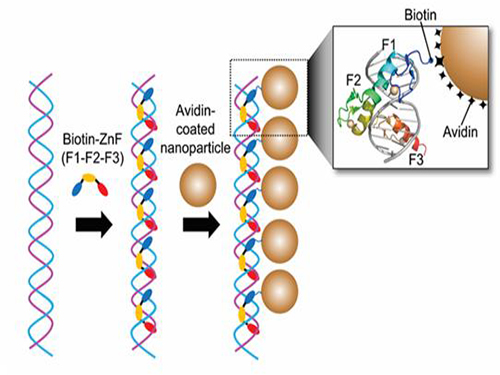 Nanoparticle Cluster Manufacturing Technique Using DNA Binding Protein Developed
Professor Hak-Sung Kim of the Department of Biological Sciences at KAIST and Yiseul Ryu, a doctoral candidate, used the Zinc Finger protein that specifically binds to target DNA sequence to develop a new manufacturing technique for size-controllable magnetic Nanoparticle Clusters (NPCs). Their research results were published in Angewandte Chemie International Edition online on 25 November 2014.
NPCs are structures consisting of magnetic nanoparticles, gold nanoparticles, and quantum dots, each of which are smaller than 100 nm (10-9m). NPCs have a distinctive property of collectivity not seen in single nanoparticles.
Specifically NPCS differ in physical and optical properties such as Plasmon coupling absorbance, energy transfers between particles, electron transfers, and conductivity. Therefore, NPCs can be employed in biological and medical research as well as the development of nanoelectric and nanoplasmon devices.
To make use of these novel properties, the size and the composition of the cluster must be exquisitely controlled. However, previous techniques relied on chemical binding which required complex steps, making it difficult to control the size and composition of NPCs.
Professor Kim’s team used Zinc Finger, a DNA binding protein, to develop a NPCs manufacturing technique to create clusters of the desired size easily. The Zinc Finger protein contains a zinc ion and specifically recognizes DNA sequence upon binding, which allows the exquisite control of the size and the cluster composition. The technique is also bio-friendly.
Professor Kim’s team created linear structure of different sizes of NPCs using Zinc Finger proteins and three DNA sequences of different lengths. The NPCs they produced confirmed their ability to control the size and structure of the cluster by using different DNA lengths.
The NPCs showed tripled T2 relaxation rates compared to the existing MRI contrast media (Feridex) and effectively transported to targeted cells. The research findings show the potential use of NPCs in biological and medical fields such as MRI contrast media, fluorescence imaging, and drug transport.
The research used the specific binding property of protein and DNA to develop a new method to create an inorganic nanoparticle’s supramolecular assembly. The technique can be used and applied extensively in other nanoparticles for future research in diagnosis, imaging, and drug and gene delivery.
Figure 1. A Mimetic Diagram of NPCs Manufacturing Technique Using DNA Binding Protein Zinc Finger
Figure 2. Transmission Electron Microscopy Images showing different sizes of NPCs depending on the length of the DNA
2014.12.04 View 15151
Nanoparticle Cluster Manufacturing Technique Using DNA Binding Protein Developed
Professor Hak-Sung Kim of the Department of Biological Sciences at KAIST and Yiseul Ryu, a doctoral candidate, used the Zinc Finger protein that specifically binds to target DNA sequence to develop a new manufacturing technique for size-controllable magnetic Nanoparticle Clusters (NPCs). Their research results were published in Angewandte Chemie International Edition online on 25 November 2014.
NPCs are structures consisting of magnetic nanoparticles, gold nanoparticles, and quantum dots, each of which are smaller than 100 nm (10-9m). NPCs have a distinctive property of collectivity not seen in single nanoparticles.
Specifically NPCS differ in physical and optical properties such as Plasmon coupling absorbance, energy transfers between particles, electron transfers, and conductivity. Therefore, NPCs can be employed in biological and medical research as well as the development of nanoelectric and nanoplasmon devices.
To make use of these novel properties, the size and the composition of the cluster must be exquisitely controlled. However, previous techniques relied on chemical binding which required complex steps, making it difficult to control the size and composition of NPCs.
Professor Kim’s team used Zinc Finger, a DNA binding protein, to develop a NPCs manufacturing technique to create clusters of the desired size easily. The Zinc Finger protein contains a zinc ion and specifically recognizes DNA sequence upon binding, which allows the exquisite control of the size and the cluster composition. The technique is also bio-friendly.
Professor Kim’s team created linear structure of different sizes of NPCs using Zinc Finger proteins and three DNA sequences of different lengths. The NPCs they produced confirmed their ability to control the size and structure of the cluster by using different DNA lengths.
The NPCs showed tripled T2 relaxation rates compared to the existing MRI contrast media (Feridex) and effectively transported to targeted cells. The research findings show the potential use of NPCs in biological and medical fields such as MRI contrast media, fluorescence imaging, and drug transport.
The research used the specific binding property of protein and DNA to develop a new method to create an inorganic nanoparticle’s supramolecular assembly. The technique can be used and applied extensively in other nanoparticles for future research in diagnosis, imaging, and drug and gene delivery.
Figure 1. A Mimetic Diagram of NPCs Manufacturing Technique Using DNA Binding Protein Zinc Finger
Figure 2. Transmission Electron Microscopy Images showing different sizes of NPCs depending on the length of the DNA
2014.12.04 View 15151 -
 A Volunteer Project by Students: The Surprise Bus!
GoGeeks, one of the undergraduate student clubs at KAIST, plans to run a bus to take volunteers to places where help is needed such as nursing homes, orphanages, and community centers. This volunteer project is called “Surprise Bus!” Students interested in participating in the project can apply online via a social funding website, http://tumblbug.com, until December 5, 2014. Up to 150 students will be selected.
A total of five buses will leave from Seoul on December 20, 2014 to several places nationwide. Participants will not know their final destination until they arrive at the scene where they will work. GoGeeks was inspired by the “Do Good Bus” project, a volunteer organization that started in the US, through which people meet, and while performing their volunteer activities, they get to know each other.
Bum-Kyu Lee, the President of GoGeeks, who is a senior in the Department of Industrial and Systems Engineering, said, “I’ve encountered many students who want to volunteer, but they are not sure where to go to start. The “Surprise Bus!” is a wonderful volunteer opportunity, and I think participants will have fun and, at the same time, will have a meaningful time. The Christmas season is also an excellent time to do something good for our communities and neighborhoods.”
2014.12.04 View 8047
A Volunteer Project by Students: The Surprise Bus!
GoGeeks, one of the undergraduate student clubs at KAIST, plans to run a bus to take volunteers to places where help is needed such as nursing homes, orphanages, and community centers. This volunteer project is called “Surprise Bus!” Students interested in participating in the project can apply online via a social funding website, http://tumblbug.com, until December 5, 2014. Up to 150 students will be selected.
A total of five buses will leave from Seoul on December 20, 2014 to several places nationwide. Participants will not know their final destination until they arrive at the scene where they will work. GoGeeks was inspired by the “Do Good Bus” project, a volunteer organization that started in the US, through which people meet, and while performing their volunteer activities, they get to know each other.
Bum-Kyu Lee, the President of GoGeeks, who is a senior in the Department of Industrial and Systems Engineering, said, “I’ve encountered many students who want to volunteer, but they are not sure where to go to start. The “Surprise Bus!” is a wonderful volunteer opportunity, and I think participants will have fun and, at the same time, will have a meaningful time. The Christmas season is also an excellent time to do something good for our communities and neighborhoods.”
2014.12.04 View 8047 -
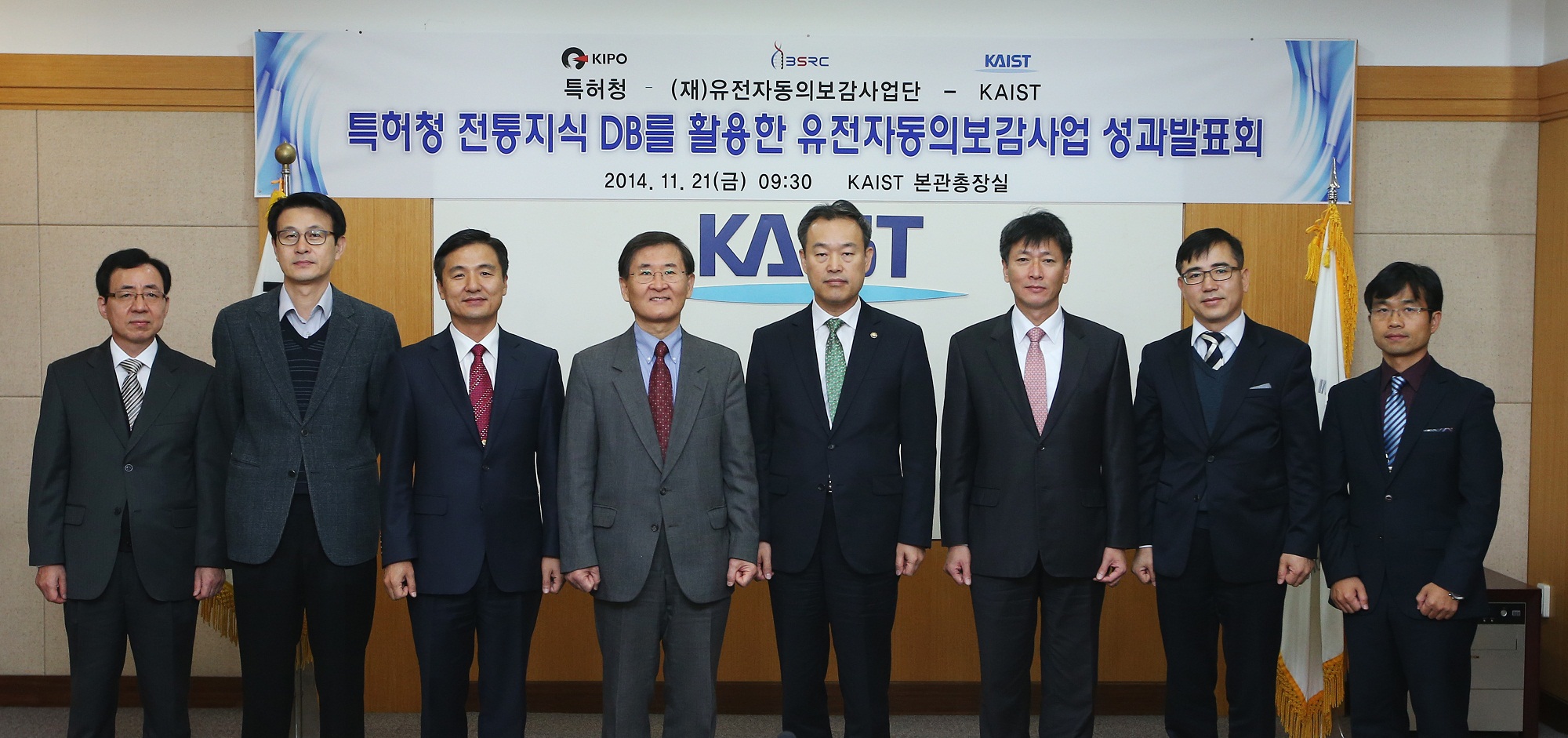 The Bio-Synergy Research Center, KAIST, Hosts an Annual Meeting
The Ministry of Science, ICT and Future Planning of the Republic of Korea founded the Bio-Synergy Research Center (BSRC) at KAIST in 2013 to develop source technology and generate new knowledge by conducting convergence research projects in natural resources with information technology (IT) and biotechnology.
The BSRC hosted an annual meeting on November 21, 2014, at the KAIST campus and reviewed the progress it made this year with the participation of President Steve Kang of KAIST, Commissioner Young-min Kim of KIPO, and Director Doheon Lee of BSRC.
The Korean Intellectual Property Office (KIPO) provided BSRC with its database in Korean traditional medicine that includes a vast amount of information about disease symptoms, native medicinal herbs and plant extracts, prescriptions, and chemical compounds used for medication. The database, “Compound Combination-Oriented Natural Product Database with Unified Terminology (COCUNUT),” holds approximately one million data sets in four major categories: prescriptions, medicinal resources, medicine components and functions, and diseases.
Based on COCUNUT, BSRC has been working on the standardization of Korean traditional medicine such as the development of data mapping and text mining technology and the analysis of big data in accordance with the said categories. Using IT and biotechnology, the center has also created a virtual human body to explain how traditional medicine works in human body, thereby contributing to the development of new natural materials for medicine.
2014.12.03 View 8996
The Bio-Synergy Research Center, KAIST, Hosts an Annual Meeting
The Ministry of Science, ICT and Future Planning of the Republic of Korea founded the Bio-Synergy Research Center (BSRC) at KAIST in 2013 to develop source technology and generate new knowledge by conducting convergence research projects in natural resources with information technology (IT) and biotechnology.
The BSRC hosted an annual meeting on November 21, 2014, at the KAIST campus and reviewed the progress it made this year with the participation of President Steve Kang of KAIST, Commissioner Young-min Kim of KIPO, and Director Doheon Lee of BSRC.
The Korean Intellectual Property Office (KIPO) provided BSRC with its database in Korean traditional medicine that includes a vast amount of information about disease symptoms, native medicinal herbs and plant extracts, prescriptions, and chemical compounds used for medication. The database, “Compound Combination-Oriented Natural Product Database with Unified Terminology (COCUNUT),” holds approximately one million data sets in four major categories: prescriptions, medicinal resources, medicine components and functions, and diseases.
Based on COCUNUT, BSRC has been working on the standardization of Korean traditional medicine such as the development of data mapping and text mining technology and the analysis of big data in accordance with the said categories. Using IT and biotechnology, the center has also created a virtual human body to explain how traditional medicine works in human body, thereby contributing to the development of new natural materials for medicine.
2014.12.03 View 8996 -
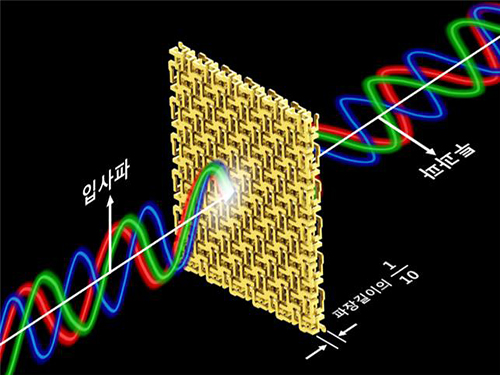 Broadband and Ultrathin Polarization Manipulators Developed
Professor Bumki Min from the Department of Mechanical Engineering at KAIST has developed a technology that can manipulate a polarized light in broadband operation with the use of a metamaterial.
It is expected that this technology will lead to the development of broadband optical devices that can be applied to broadband communication and display.
When an object or its structure is analyzed by using a polarized light such as a laser, the results are generally affected by the polarized state of the light. Therefore, in an optics laboratory, the light is polarized by various methods.
In such cases, researchers employ wave plates or photoactive materials. However, the performance of these devices depend vastly on wavelength, and so they are not suitable to be used as a polarizer, especially in broadband.
There were many attempts to make artificial materials that are very photoactive by using metamaterials which have a strong resonance. Nonetheless, because the materials had an unavoidable dispersion in the resonance frequency, they were not adequate for broadband operation.
Professor Min’s research team arranged and connected helical metamaterials that are smaller than the wavelength of light. They verified theoretically and experimentally that polarized light can be constantly rotated regardless of the wavelength by super-thin materials that have thickness less than one-tenth of the wavelength of the light. The experiment which confirmed the theory was conducted in the microwave band.
Broadband polarized rotational 3D metamaterials were found to rotate the polarized microwave within the range of 0.1 GHz to 40 GHz by 45 degrees regardless of its frequency. This nondispersive property is quite unnatural because it is difficult to find a material that does not change in a wide band.
In addition, the research team materialized the broadband nondispersive polarized rotational property by designing the metamaterial in a way that it has chirality, which determines the number of rotations proportional to the wavelength.
Professor Min said, “As the technology is able to manipulate ultrathin polarization of light in broadband, it will lead to the creation of ultra-shallow broadband optical devices.”
Sponsored by the Ministry of Science, ICT and Future Planning of the Republic of Korea and the National Research Foundation of Korea, this research was led by a PhD candidate, Hyun-Sung Park, under the guidance of Professor Min. The research findings were published online in the November 17th issue of Nature Communications.
Figure 1 – Broadband and Ultrathin Polarization Manipulators Produced by 3D Printer
Figure 2 – Concept of Broadband and Ultrathin Polarization Manipulators
2014.12.03 View 13495
Broadband and Ultrathin Polarization Manipulators Developed
Professor Bumki Min from the Department of Mechanical Engineering at KAIST has developed a technology that can manipulate a polarized light in broadband operation with the use of a metamaterial.
It is expected that this technology will lead to the development of broadband optical devices that can be applied to broadband communication and display.
When an object or its structure is analyzed by using a polarized light such as a laser, the results are generally affected by the polarized state of the light. Therefore, in an optics laboratory, the light is polarized by various methods.
In such cases, researchers employ wave plates or photoactive materials. However, the performance of these devices depend vastly on wavelength, and so they are not suitable to be used as a polarizer, especially in broadband.
There were many attempts to make artificial materials that are very photoactive by using metamaterials which have a strong resonance. Nonetheless, because the materials had an unavoidable dispersion in the resonance frequency, they were not adequate for broadband operation.
Professor Min’s research team arranged and connected helical metamaterials that are smaller than the wavelength of light. They verified theoretically and experimentally that polarized light can be constantly rotated regardless of the wavelength by super-thin materials that have thickness less than one-tenth of the wavelength of the light. The experiment which confirmed the theory was conducted in the microwave band.
Broadband polarized rotational 3D metamaterials were found to rotate the polarized microwave within the range of 0.1 GHz to 40 GHz by 45 degrees regardless of its frequency. This nondispersive property is quite unnatural because it is difficult to find a material that does not change in a wide band.
In addition, the research team materialized the broadband nondispersive polarized rotational property by designing the metamaterial in a way that it has chirality, which determines the number of rotations proportional to the wavelength.
Professor Min said, “As the technology is able to manipulate ultrathin polarization of light in broadband, it will lead to the creation of ultra-shallow broadband optical devices.”
Sponsored by the Ministry of Science, ICT and Future Planning of the Republic of Korea and the National Research Foundation of Korea, this research was led by a PhD candidate, Hyun-Sung Park, under the guidance of Professor Min. The research findings were published online in the November 17th issue of Nature Communications.
Figure 1 – Broadband and Ultrathin Polarization Manipulators Produced by 3D Printer
Figure 2 – Concept of Broadband and Ultrathin Polarization Manipulators
2014.12.03 View 13495 -
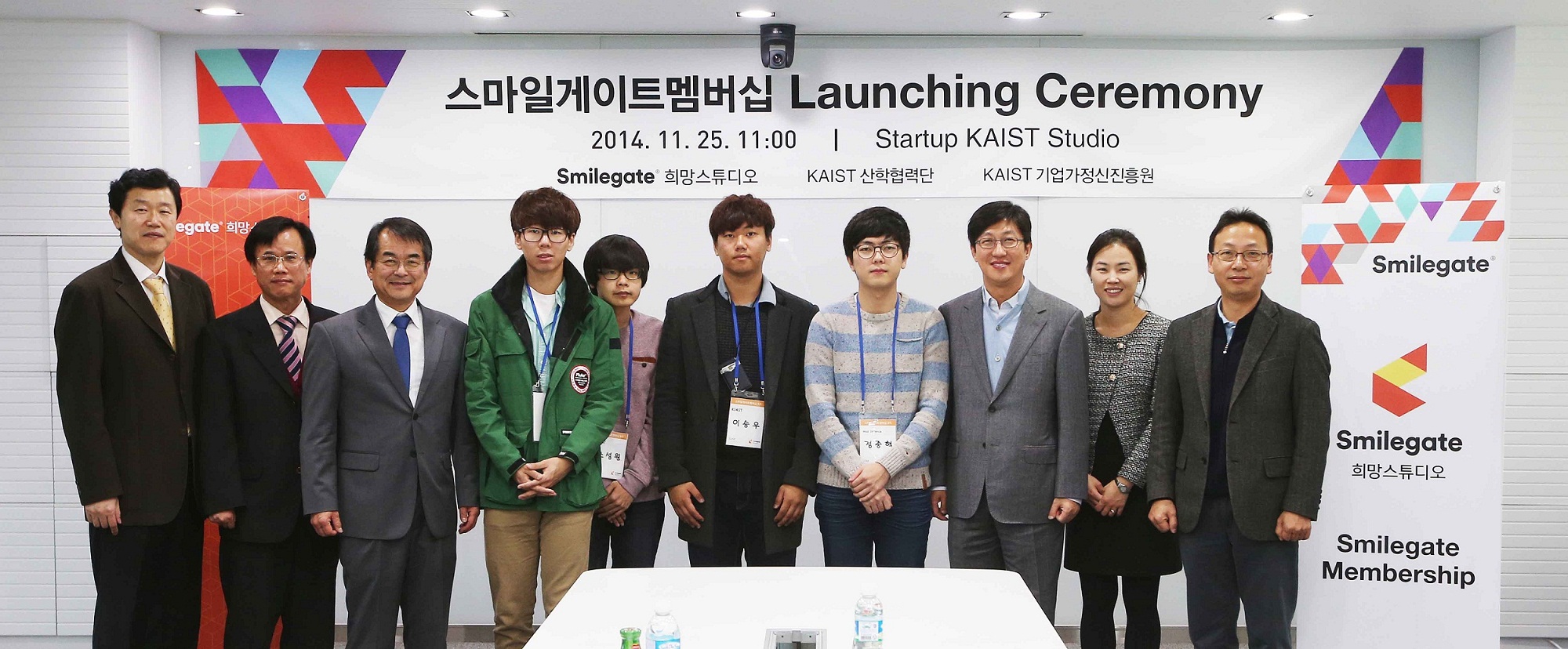 SmileGate Membership Program for Students and Video Game Industry in Korea
The Office of University and Industry Cooperation at KAIST and SmileGate, a video game developer based in Korea, agreed in June 2014 to cooperate in the development of talents for the video game industry in Korea and to support students’ startup efforts.
The company established the SmileGate Studio at the KAIST campus in 2010 and has been supporting KAIST students who are interested in video game design and development, such as hosting design competitions and offering networking opportunities as well as consulting services for startups.
The Studio launched a scholarship program called the “SmileGate Membership” in November this year to offer 12 students research funding, equipment and tools for game design and development, and mentoring services for eight months. Participating students will also receive free space for research and development, legal services for business development, investment advice, and assistance in networking with the global community after the completion of the program.
Professor Joongmyeon Bae, the Dean of the KAIST Office of University and Industry Cooperation, said, “This is a great opportunity for our students because they can actually utilize their passion and creativity to make their own games. KAIST and SmileGate will continue to lead the video game industry in Korea through close collaboration.”
2014.12.03 View 9857
SmileGate Membership Program for Students and Video Game Industry in Korea
The Office of University and Industry Cooperation at KAIST and SmileGate, a video game developer based in Korea, agreed in June 2014 to cooperate in the development of talents for the video game industry in Korea and to support students’ startup efforts.
The company established the SmileGate Studio at the KAIST campus in 2010 and has been supporting KAIST students who are interested in video game design and development, such as hosting design competitions and offering networking opportunities as well as consulting services for startups.
The Studio launched a scholarship program called the “SmileGate Membership” in November this year to offer 12 students research funding, equipment and tools for game design and development, and mentoring services for eight months. Participating students will also receive free space for research and development, legal services for business development, investment advice, and assistance in networking with the global community after the completion of the program.
Professor Joongmyeon Bae, the Dean of the KAIST Office of University and Industry Cooperation, said, “This is a great opportunity for our students because they can actually utilize their passion and creativity to make their own games. KAIST and SmileGate will continue to lead the video game industry in Korea through close collaboration.”
2014.12.03 View 9857 -
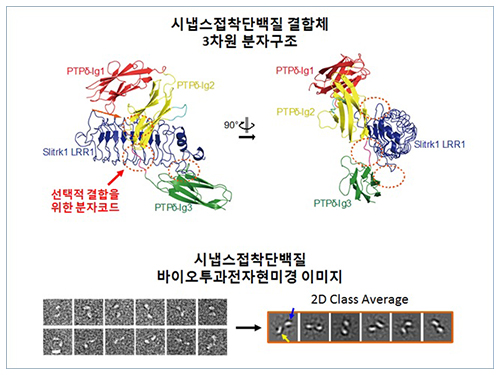 Structure of Neuron-Connecting Synaptic Adhesion Molecules Discovered
A research team has found the three-dimensional structure of synaptic adhesion molecules, which orchestrate synaptogenesis. The research findings also propose the mechanism of synapses in its initial formation. Some brain diseases such as obsessive compulsive disorder (OCD) or bipolar disorders arise from a malfunction of synapses. The team expects the findings to be applied in investigating pathogenesis and developing medicines for such diseases.
The research was conducted by a Master’s candidate Kee Hun Kim, Professor Ji Won Um from Yonsei University, and Professor Beom Seok Park from Eulji University under the guidance of Professor Homin Kim from the Graduate School of Medical Science and Engineering, KAIST, and Professor Jaewon Ko from Yonsei University. Sponsored by the Ministry of Science, ICT and Future Planning and the National Research Foundation of Korea, the research findings were published online in the November 14th issue of Nature Communications.
A protein that exists in the neuronal transmembrane, Slitrk, interacts with the presynaptic leukocyte common antigen-related receptor protein tyrosine phosphatases (LAR-RPTPs) and forms a protein complex. It is involved in the development of synapses in the initial stage, and balances excitatory and inhibitory signals of neurons.
It is known that a disorder in those two proteins cause a malfunction of synapses, resulting in neuropsychosis such as autism, epilepsy, OCD, and bipolar disorders. However, because the structure as well as synaptogenic function of these proteins were not understood, the development of cures could not progress.
The research team discovered the three-dimensional structure of two synaptic adhesion molecules like Slitrk and LAR-RPTPs and identified the regions of interaction through protein crystallography and transmission electron microscopy (TEM). Furthermore, they found that the formation of the synapse is induced after the combination of two synaptic adhesion molecules develops a cluster.
Professor Kim said, “The research findings will serve as a basis of understanding the pathogenesis of brain diseases which arises from a malfunction of synaptic adhesion molecules. In particular, this is a good example in which collaboration between structural biology and neurobiology has led to a fruitful result.” Professor Ko commented that “this will give new directions to synaptic formation-related-researches by revealing the molecular mechanism of synaptic adhesion molecules.”
Figure 1: Overview of the PTPd Ig1–3/Slitrk1 LRR1 complex.
Figure 2: Representative negative-stained electron microscopy images of Slitrk1 Full ectodomain (yellow arrows indicate the horseshoe-shaped LRR domains). The typical horseshoe-shaped structures and the randomness of the relative positions of each LRR domain can be observed from the two-dimensional class averages displayed in the orange box.
Figure 3: Model of the two-step presynaptic differentiation process mediated by the biding of Slitrks to LAR-RPTPs and subsequent lateral assembly of trans-synaptic LAR-RPTPs/Slitrik complexes.
2014.11.28 View 13504
Structure of Neuron-Connecting Synaptic Adhesion Molecules Discovered
A research team has found the three-dimensional structure of synaptic adhesion molecules, which orchestrate synaptogenesis. The research findings also propose the mechanism of synapses in its initial formation. Some brain diseases such as obsessive compulsive disorder (OCD) or bipolar disorders arise from a malfunction of synapses. The team expects the findings to be applied in investigating pathogenesis and developing medicines for such diseases.
The research was conducted by a Master’s candidate Kee Hun Kim, Professor Ji Won Um from Yonsei University, and Professor Beom Seok Park from Eulji University under the guidance of Professor Homin Kim from the Graduate School of Medical Science and Engineering, KAIST, and Professor Jaewon Ko from Yonsei University. Sponsored by the Ministry of Science, ICT and Future Planning and the National Research Foundation of Korea, the research findings were published online in the November 14th issue of Nature Communications.
A protein that exists in the neuronal transmembrane, Slitrk, interacts with the presynaptic leukocyte common antigen-related receptor protein tyrosine phosphatases (LAR-RPTPs) and forms a protein complex. It is involved in the development of synapses in the initial stage, and balances excitatory and inhibitory signals of neurons.
It is known that a disorder in those two proteins cause a malfunction of synapses, resulting in neuropsychosis such as autism, epilepsy, OCD, and bipolar disorders. However, because the structure as well as synaptogenic function of these proteins were not understood, the development of cures could not progress.
The research team discovered the three-dimensional structure of two synaptic adhesion molecules like Slitrk and LAR-RPTPs and identified the regions of interaction through protein crystallography and transmission electron microscopy (TEM). Furthermore, they found that the formation of the synapse is induced after the combination of two synaptic adhesion molecules develops a cluster.
Professor Kim said, “The research findings will serve as a basis of understanding the pathogenesis of brain diseases which arises from a malfunction of synaptic adhesion molecules. In particular, this is a good example in which collaboration between structural biology and neurobiology has led to a fruitful result.” Professor Ko commented that “this will give new directions to synaptic formation-related-researches by revealing the molecular mechanism of synaptic adhesion molecules.”
Figure 1: Overview of the PTPd Ig1–3/Slitrk1 LRR1 complex.
Figure 2: Representative negative-stained electron microscopy images of Slitrk1 Full ectodomain (yellow arrows indicate the horseshoe-shaped LRR domains). The typical horseshoe-shaped structures and the randomness of the relative positions of each LRR domain can be observed from the two-dimensional class averages displayed in the orange box.
Figure 3: Model of the two-step presynaptic differentiation process mediated by the biding of Slitrks to LAR-RPTPs and subsequent lateral assembly of trans-synaptic LAR-RPTPs/Slitrik complexes.
2014.11.28 View 13504 -
 Breakthrough in Flexible Electronics Enabled by Inorganic-based Laser Lift-off
Flexible electronics have been touted as the next generation in electronics in various areas, ranging from consumer electronics to bio-integrated medical devices. In spite of their merits, insufficient performance of organic materials arising from inherent material properties and processing limitations in scalability have posed big challenges to developing all-in-one flexible electronics systems in which display, processor, memory, and energy devices are integrated. The high temperature processes, essential for high performance electronic devices, have severely restricted the development of flexible electronics because of the fundamental thermal instabilities of polymer materials.
A research team headed by Professor Keon Jae Lee of the Department of Materials Science and Engineering at KAIST provides an easier methodology to realize high performance flexible electronics by using the Inorganic-based Laser Lift-off (ILLO).
The ILLO process involves depositing a laser-reactive exfoliation layer on rigid substrates, and then fabricating ultrathin inorganic electronic devices, e.g., high density crossbar memristive memory on top of the exfoliation layer. By laser irradiation through the back of the substrate, only the ultrathin inorganic device layers are exfoliated from the substrate as a result of the reaction between laser and exfoliation layer, and then subsequently transferred onto any kind of receiver substrate such as plastic, paper, and even fabric.
This ILLO process can enable not only nanoscale processes for high density flexible devices but also the high temperature process that was previously difficult to achieve on plastic substrates. The transferred device successfully demonstrates fully-functional random access memory operation on flexible substrates even under severe bending.
Professor Lee said, “By selecting an optimized set of inorganic exfoliation layer and substrate, a nanoscale process at a high temperature of over 1000 °C can be utilized for high performance flexible electronics. The ILLO process can be applied to diverse flexible electronics, such as driving circuits for displays and inorganic-based energy devices such as battery, solar cell, and self-powered devices that require high temperature processes.”
The team’s results were published in the November issue of Wiley’s journal, ‘ Advanced Materials, ’ as a cover article entitled “ Flexible Crossbar-Structured Resistive Memory Arrays on Plastic Substrates via Inorganic-Based Laser Lift-Off.”
( http://onlinelibrary.wiley.com/doi/10.1002/adma.201402472/abstract )
This schematic picture shows the flexible crossbar memory developed via the ILLO process.
This photo shows the flexible RRAM device on a plastic substrate.
2014.11.26 View 11180
Breakthrough in Flexible Electronics Enabled by Inorganic-based Laser Lift-off
Flexible electronics have been touted as the next generation in electronics in various areas, ranging from consumer electronics to bio-integrated medical devices. In spite of their merits, insufficient performance of organic materials arising from inherent material properties and processing limitations in scalability have posed big challenges to developing all-in-one flexible electronics systems in which display, processor, memory, and energy devices are integrated. The high temperature processes, essential for high performance electronic devices, have severely restricted the development of flexible electronics because of the fundamental thermal instabilities of polymer materials.
A research team headed by Professor Keon Jae Lee of the Department of Materials Science and Engineering at KAIST provides an easier methodology to realize high performance flexible electronics by using the Inorganic-based Laser Lift-off (ILLO).
The ILLO process involves depositing a laser-reactive exfoliation layer on rigid substrates, and then fabricating ultrathin inorganic electronic devices, e.g., high density crossbar memristive memory on top of the exfoliation layer. By laser irradiation through the back of the substrate, only the ultrathin inorganic device layers are exfoliated from the substrate as a result of the reaction between laser and exfoliation layer, and then subsequently transferred onto any kind of receiver substrate such as plastic, paper, and even fabric.
This ILLO process can enable not only nanoscale processes for high density flexible devices but also the high temperature process that was previously difficult to achieve on plastic substrates. The transferred device successfully demonstrates fully-functional random access memory operation on flexible substrates even under severe bending.
Professor Lee said, “By selecting an optimized set of inorganic exfoliation layer and substrate, a nanoscale process at a high temperature of over 1000 °C can be utilized for high performance flexible electronics. The ILLO process can be applied to diverse flexible electronics, such as driving circuits for displays and inorganic-based energy devices such as battery, solar cell, and self-powered devices that require high temperature processes.”
The team’s results were published in the November issue of Wiley’s journal, ‘ Advanced Materials, ’ as a cover article entitled “ Flexible Crossbar-Structured Resistive Memory Arrays on Plastic Substrates via Inorganic-Based Laser Lift-Off.”
( http://onlinelibrary.wiley.com/doi/10.1002/adma.201402472/abstract )
This schematic picture shows the flexible crossbar memory developed via the ILLO process.
This photo shows the flexible RRAM device on a plastic substrate.
2014.11.26 View 11180 -
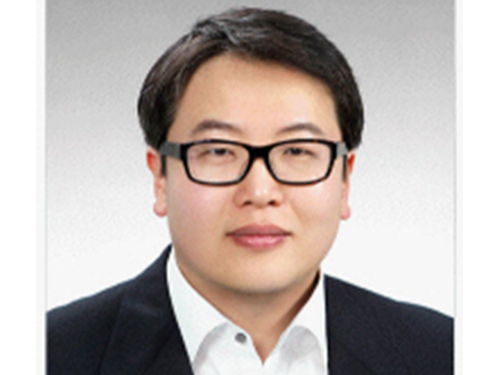 Elsevier Selects a KAIST Graduate's Paper as the Top Cited Papers in 2011-2012
Dr. Myung-Won Seo, a graduate from the Department of Chemical and Bimolecular Engineering at KAIST, published a paper in January 2011 in Chemical Engineering Journal, which was entitled “Solid Circulation and Loop-seal Characteristics of a Dual Circulating Fluidized Bed: Experiments and CFD Simulation.” His paper was selected by Elsevier as the Top Cited Papers of 2011-2012. The Chemical Engineering Journal is a renowned peer-reviewed journal issued by Elsevier.
Dr. Seo published another paper, “CFD Simulation with Experiments in a Dual Circulating Fluidized Bed Gasifier,” in January 2012 in Computers & Chemical Engineering, which was also selected as the Most Downloaded Papers in 2012-2013.
Dr. Seo graduated with a doctoral degree from KAIST in 2011. He is currently working at the Clean Fuel Laboratory, the Korea Institute of Energy Research, Daejeon, as a researcher. His research areas are coal gasification, upgrading, and liquefaction, as well as energy and chemical production from low-grade fuels such as biomass and wastes.
2014.11.24 View 11430
Elsevier Selects a KAIST Graduate's Paper as the Top Cited Papers in 2011-2012
Dr. Myung-Won Seo, a graduate from the Department of Chemical and Bimolecular Engineering at KAIST, published a paper in January 2011 in Chemical Engineering Journal, which was entitled “Solid Circulation and Loop-seal Characteristics of a Dual Circulating Fluidized Bed: Experiments and CFD Simulation.” His paper was selected by Elsevier as the Top Cited Papers of 2011-2012. The Chemical Engineering Journal is a renowned peer-reviewed journal issued by Elsevier.
Dr. Seo published another paper, “CFD Simulation with Experiments in a Dual Circulating Fluidized Bed Gasifier,” in January 2012 in Computers & Chemical Engineering, which was also selected as the Most Downloaded Papers in 2012-2013.
Dr. Seo graduated with a doctoral degree from KAIST in 2011. He is currently working at the Clean Fuel Laboratory, the Korea Institute of Energy Research, Daejeon, as a researcher. His research areas are coal gasification, upgrading, and liquefaction, as well as energy and chemical production from low-grade fuels such as biomass and wastes.
2014.11.24 View 11430